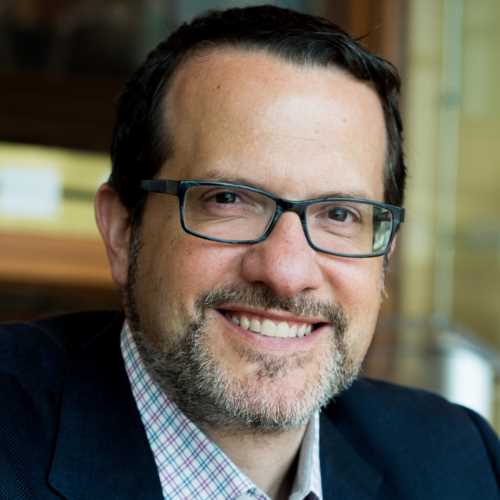
Aaron Carroll
- President & CEO of AcademyHealth
- Distinguished Professor of Pediatrics and Chief Health Officer at Indiana University
- Distinguished Speaker on Healthcare
- Director of the Center for Health Policy and Professionalism Research
- Professor of Pediatrics at Indiana University School of Medicine
Travels From
Indiana
Aaron Carroll Speaker Biography
Dr. Aaron E. Carroll is President & CEO of AcademyHealth. A nationally recognized thought leader, science communicator, pediatrician, and health services researcher, he is a passionate advocate for the creation and use of evidence to improve health and health care for all.
Before joining AcademyHealth, Dr. Carroll was a Distinguished Professor of Pediatrics and Chief Health Officer at Indiana University, where he also served as Associate Dean for Research Mentoring and the director of the Center for Pediatric and Adolescent Comparative Effectiveness Research at Indiana University School of Medicine. He earned a B.A. in chemistry from Amherst College, an MD from the University of Pennsylvania School of Medicine, and an M.S. in health services from the University of Washington School of Public Health, where he was also a Robert Wood Johnson Clinical Scholar.
Dr. Carroll’s research focused on the study of information technology to improve pediatric care, decision analysis, and areas of health policy including cost-effectiveness of care and health care financing reform. He is the author of The Bad Food Bible and the co-author of three additional books on medical myths. In addition to having been a regular contributor to The New York Times and The Atlantic, he has written for many other major media outlets and is co-Editor-in-Chief at The Incidental Economist, an evidence-based health policy blog. He also has a popular YouTube channel and podcast called Healthcare Triage, where he talks about health research and health policy.
The Affordable Care Act: Preparing for 2015 and Beyond
Listening to media coverage about the US health care system, it can seem impossible to get a real handle on what’s going on. Moreover, understanding what the future holds for health care reform, and how it will affect people, businesses, and the country doesn’t appear possible. This year is just as critical as the last one, when most of the major regulations and changes went into effect. Dr. Carroll, a leading expert on health care reform, uses publicly available data and unbiased research to cut through the rhetoric and clearly explain the coming changes, including: · The Medicaid Expansion: What will happen in different states? What will it mean for individuals? For physicians? For hospitals? For the health care industry? Where are things moving? · The Health Insurance Exchanges: Where do we stand in the implementation of this critical endeavor? What will it mean for businesses? For individuals? How will cases before the Supreme Court affect how exchanges function? · New payment structures: What will Accountable Care mean to you? How will reimbursement change for health care providers? · New regulations: The ACA brings with it new taxes, new fees, and new rules. Many of these are changing all of the time. How will they affect your industry?
Moving Forward: The Future of Information Technology In Health Care
Although great improvements in the use of information technology always seem to be right around the corner, our health care system is still in the Stone Age with respect to its use. It is shocking, and somewhat embarrassing, that while computers and information systems are the backbone of nearly every other industry or endeavor in the world, the health care system often lacks even the simplest of improvements. The HITECH Act promises to change all of this, and claims are being made that real innovation is just around the corner. This is even more true as company after company is promising that the collection, transmission, and analysis of digital health data will revolutionize the ways in which we improve health. But there are any number of barriers still standing in the way of progress. Dr. Carroll discusses the many attempts made, why they have succeeded or failed, and how we can move forward. He covers the many misunderstandings of information technology, the potential it holds, and the limitations that are often ignored.
Emerging Technologies Drive the Future of Healthcare
In this keynote, Dr. Aaron Carroll addresses the specific impact that consumer-originated technologies will have in health care and further how the marketplace will be affected by, and can take advantage of, new technologies that originate and develop in the consumer space. For example: ~ How will mobile apps, DIY health care kits, physician extenders and the one-click millennials impact healthcare? ~ How will consumers use the quality measures regulators publish? Dr. Carroll co-owned one of the first companies to write medical software for Palm Pilots (and that really dates him). He will deliver his thoughts on mobile apps, Apple’s Healthkit, physician extenders, minute clinics, personal health records, and more. His expertise has been published at his blog theincidentaleconomist.com, in the medical literature, and in the New York Times, to name a few. Bottom line, those who learn how to leverage and embrace emerging technologies to cater to consumer expectations will drive the future of health care for those who deliver, pay for or regulate it.
The ABC's of the ACA (Affordable Care Act)
The Supreme Court ruled that the Affordable Care Act is constitutional, and Obamacare lives on. However, the future of healthcare is far from stable. The ruling made the Medicaid expansion “optional”, making the future murky for the 17 million Americans who should become uninsured through Medicaid in the future. Moreover, the political landscape of health care reform is still shifting, making the upcoming election a pivotal turning point in how our health care system works. Unfortunately, listening to media coverage about the US health care system, it can seem impossible to get a real handle on what’s going on. Understanding what the future holds for health care reform, and how it will affect people, businesses, and the country doesn’t appear possible. Dr. Carroll, a leading expert on health care reform, uses publicly available data and unbiased research to cut through the rhetoric and clearly explain the issues with our current system. He explains how the Affordable Care Act will really work, details what it contains, and how it will likely be implemented over the next decade. At the conclusion, audience members truly gain an understanding of the complexity of the problem along with the trade-offs that are inevitable in trying to fix the $2.7 trillion US health care system.













